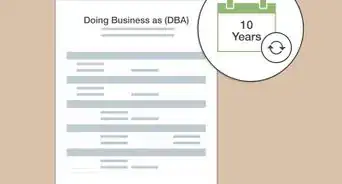X
This article was co-authored by Clinton M. Sandvick, JD, PhD. Clinton M. Sandvick worked as a civil litigator in California for over 7 years. He received his JD from the University of Wisconsin-Madison in 1998 and his PhD in American History from the University of Oregon in 2013.
This article has been viewed 29,365 times.
A Limited Liability Corporation, or LLC, is a popular business structure option that provides tax benefits and protection from personal liability. To form an LLC in North Carolina, all you have to do is complete some simple paperwork and register your business with the appropriate agencies. Once you have formed and registered your LLC, you will be able to begin operating your business in North Carolina.
Steps
Part 1
Part 1 of 3:
Deciding If an LLC Is Right for Your Business
-
1Understand the management structure. When you form an LLC, you will be required to designate members and managers. Members have ownership rights in the company, while managers are simply designated to make certain managerial decisions. You can designate as many members and managers as you wish.[1]
- Anyone who is designated a member will have to approve in order for the company to be sold, dissolved, or merged, for another member to be added, or for changes to be made to the Operating Agreement.
- In general, all members are managers of the LLC, but it is possible to designate someone as a manager who is not a member.
-
2Learn about tax codes. One of the benefits of an LLC is that members typically pay less in taxes than they would if they owned a corporation. The members of an LLC do not have to pay corporate income taxes, but do have to declare any income they make from the business on their personal tax returns.[2]Advertisement
-
3Learn about liability. Another benefit of an LLC is it's members are typically not personally responsible for the business's debts. Likewise, if one of the members has personal debts, the LLC will not typically be responsible for paying them.[3]
-
4Consider your other options. There are a variety of other business structure options available to you in North Carolina, and each has different benefits and drawbacks. Carefully consider all your options before forming your LLC, and consult an attorney or tax professional if you are unsure which business structure is right for you.[4]
- A sole proprietorship is owned and operated by one person, who has legal liability for the business.
- A general partnership is formed by two people who share liability for the business.
- A corporation is a separate legal entity, and owners are generally not personally liable for the business. Corporation owners are typically required to pay both corporate income and individual income taxes.
- A limited partnership is formed of general partners, who manage the business and are protected from liability, as well as limited partners, who are typically investors.
- A limited liability partnership is formed of two general partners who are protected from liability.
-
5Consult an attorney. You do not need to hire an attorney to assist in the formation of an LLC in North Carolina, but you should consider it if you have any questions about taxation, liability, or other matters.[5]
Advertisement
Part 2
Part 2 of 3:
Handling the Paperwork
-
1Choose a name. The first step in forming an LLC in North Carolina is choosing a name that will help you build your brand. When choosing a name, you must make sure that the name has not already been used by another business in North Carolina and that it does not contain any words that the State of North Carolina might find deceptive.[6]
- You can check the North Carolina Secretary of State's website to see if the name you want to use has already been taken. Your name needs to be clearly distinguishable from those of all other businesses registered in North Carolina.
- You may also wish to check with the Trademark Registration Office to ensure that your company name has not been trademarked by another organization.
- In general, the State of North Carolina may reject your name if it is determined that it misrepresents the type of business you will be conducting. If you want to use certain words, including "bank," "insurance," "Trust," and "architecture," you will need to submit proof that your business will be able to legally provide the services implied by the name.
- Your name must include the words "Limited Liability Corporation" or one of several acceptable abbreviations thereof.
-
2Choose a Registered Agent. The Registered Agent for your LLC is the person or business that will be responsible for sending and receiving official papers for your business.[7]
- If the Registered Agent is an individual, he or she must be a resident of North Carolina. If it is a business, it must be authorized to conduct business in North Carolina.
-
3Submit the Articles of Organization form. You can file the form to create an LLC, called the Articles of Organization, on the North Carolina Secretary of State's website, or you can print it and mail it to the Secretary of State's office.[8]
- When filling out the Articles of Organization form, you will be asked to provide basic information about your business, including its name, street address, mailing address, and the names of all of your business's members and organizers. You will also be given the option to create special provisions that limit the powers and/or liabilities of certain members of the LLC.
- You will be required to pay a fee upon submission of your Articles of Organization.
- There is no need to have this document notarized.
-
4Wait for your documents. You will have to wait for a certified copy of your paperwork to be returned to you by the Department of the Secretary of State, either by mail or by email. This usually takes 10 to 15 business days.
Advertisement
Part 3
Part 3 of 3:
Fulfilling Other Requirements to Legally Operate Your LLC
-
1Draft an Operating Agreement. An Operating Agreement is not required for your LLC, but it is a good idea to have one. The Operating Agreement outlines the responsibilities and rights of each member, and also provides an outline for the operational procedures of the LLC.[9]
- You may want to have an attorney draft your Operating Agreement for you, particularly if your LLC has multiple members.
-
2Apply for an EIN number. You will have to apply for an Employee Identification Number (EIN), also called a Federal Tax Identification Number, if your LLC has more than one member, if you hire employees, or if you will be opening a business bank account.[10]
- If you have an EIN, you will use this number for tax purposes. If you do not have an EIN, you will use your personal Social Security Number for tax purposes.
-
3Register with the Department of Revenue. In order to legally conduct business in North Carolina, you must register your business with the North Carolina Department of Revenue. You can do so on the Department's website, or you can download the necessary forms from the website and submit them by mail.[11]
- If your business has employees or sells certain products, you may be required to pay additional state taxes in addition to your income taxes.
-
4Apply for licences. Some types of businesses are regulated by North Carolina's Occupational Licensing Boards. These include, but are not limited to, medical business, real estate businesses, architectural firms, and lock smith businesses. Check with Business Link North Carolina to see if your business is subject to any special licensing requirements before you begin operating your business.
- Licensing requirements vary by occupation, but in general, you will be required to submit proof that your business is able to legally provide the services it offers.
-
5File annual reports. In order to keep your LLC operational, you will need to submit annual reports to the State of North Carolina by April 15 of each year. You will also be required to declare your profits and losses on your income tax returns, and to pay any additional taxes you may owe.[12]
Advertisement
Warnings
- Beware of scams! Once you have established your LLC, you may get phone calls or letters purporting to be from the State of North Carolina. If you are ever asked for money or personal information, call the Secretary of State office to check if the correspondence is legitimate.[15]⧼thumbs_response⧽
Advertisement
References
- ↑ http://www.sosnc.gov/corporations/pdf/LimitedLiabilityCompany12-13-2013.pdf
- ↑ http://www.nolo.com/legal-encyclopedia/north-carolina-state-income-tax.html
- ↑ http://www.nolo.com/legal-encyclopedia/limited-liability-protection-llcs-a-50-state-guide.html
- ↑ http://www.blnc.gov/start-your-business/selecting-a-business-structure
- ↑ http://www.sosnc.gov/corporations/pdf/LimitedLiabilityCompany12-13-2013.pdf
- ↑ http://www.sosnc.gov/corporations/pdf/LimitedLiabilityCompany12-13-2013.pdf
- ↑ http://howtostartanllc.com/north-carolina-llc
- ↑ http://www.sosnc.gov/corporations/pdf/LimitedLiabilityCompany12-13-2013.pdf
- ↑ http://www.sosnc.gov/corporations/pdf/LimitedLiabilityCompany12-13-2013.pdf
- ↑ http://howtostartanllc.com/north-carolina-llc
- ↑ http://www.sosnc.gov/corporations/pdf/LimitedLiabilityCompany12-13-2013.pdf
- ↑ http://www.bizfilings.com/north-carolina/ongoing-llc-requirements.aspx
- ↑ http://howtostartanllc.com/north-carolina-llc
- ↑ http://www.sosnc.gov/corporations/pdf/LimitedLiabilityCompany12-13-2013.pdf
- ↑ http://www.sosnc.gov/corporations/pdf/LimitedLiabilityCompany12-13-2013.pdf
About This Article
Advertisement



















-in-the-USA-Step-20.webp)
















































